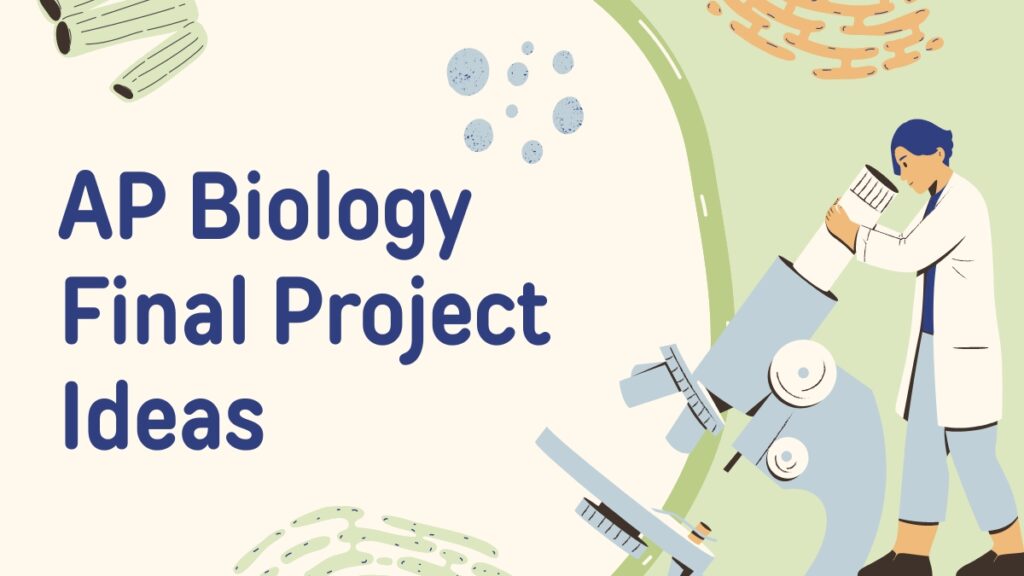Discover exciting and engaging AP Biology final project ideas to showcase your knowledge. Explore hands-on projects from ecosystems to genetics, perfect for a standout presentation.”
Ready to make your final project awesome? It’s your chance to dive into what excites you and show off your skills. From ecosystems to genetics, we’ve got cool project ideas to get you started.
Let’s make your final project fun and something you’ll be proud of. Get creative and let’s make it great!
AP Biology Final Project Ideas PDF
Importance of a Capstone Project in AP Biology
Check out the importance of capstone project in AP biology:-
- Deepens Understanding: Explore a biology topic in detail.
- Builds Research Skills: Learn how to gather and analyze data.
- Enhances Critical Thinking: Practice problem-solving in biology.
- Applies Knowledge: Connect classroom learning to real-life issues.
- Prepares for the Future: Get ready for college and science careers.
- Encourages Teamwork: Work together and improve communication.
- Boosts Confidence: Gain confidence by completing a big project.
AP Biology Final Project Ideas
Check out AP biology final project ideas:-
Ecology and Environmental Science
Local Ecosystem
- Study: Look at plants and animals in your area.
- Observe: Record their interactions and environment.
Pollution Effects
- Check: Measure how pollution affects local water or soil.
- Assess: Look at changes in quality over time.
Conservation Efforts
- Review: Examine successful local conservation projects.
- Evaluate: Measure their impact on the environment.
Climate Change
- Study: Look at how climate change affects local wildlife.
- Document: Track changes in species and habitats.
Invasive Species
- Observe: See how non-native species impact local plants and animals.
- Analyze: Record their effects on native species.
Habitat Restoration
- Work: Take part in a small habitat restoration project.
- Monitor: Track improvements in the area.
Urban Wildlife
- Investigate: Study wildlife living in city environments.
- Assess: Look at their adaptation to urban areas.
Water Quality
- Test: Measure water quality in local ponds or streams.
- Compare: Check results against safety standards.
Pollinator Health
- Study: Observe the health of bees or butterflies.
- Impact: Look at how their health affects local plants.
Ecosystem Services
- Evaluate: Look at the benefits provided by local ecosystems.
- Document: Measure things like clean air and water.
Genetics and Biotechnology
Plant Traits
- Change: Alter plant traits and observe changes.
- Record: Note how different traits develop.
DNA Profiles
- Create: Make DNA profiles for different organisms.
- Compare: Look at similarities and differences.
Gene Therapy
- Research: Explore how gene therapy can treat diseases.
- Study: Look at real-world applications.
CRISPR
- Explore: Learn how CRISPR edits genes.
- Applications: Study its uses in research.
Genetic Variation
- Examine: Study genetic differences in a plant or animal group.
- Observe: Note how variation affects traits.
Mutagens
- Test: See how mutagens affect bacterial growth.
- Analyze: Record changes and effects.
Synthetic Biology
- Build: Create a simple synthetic biological system.
- Test: Observe how it functions.
Gene Expression
- Study: Look at how different conditions affect gene activity.
- Measure: Track changes in expression levels.
Genomic Data
- Analyze: Examine DNA for mutations or specific traits.
- Interpret: Understand the implications of findings.
Biotech Medicine
- Research: Look into how biotechnology is used in medicine.
- Applications: Explore real-world examples.
Human Biology and Anatomy
Disease Impact
- Study: Look at how diseases affect body systems.
- Assess: Note changes in function and health.
Diet Effects
- Explore: Investigate how different diets affect health.
- Observe: Measure impacts on body systems.
Exercise
- Research: See how exercise impacts different body systems.
- Track: Measure changes in fitness and health.
Anatomy Models
- Create: Make models of organs or body systems.
- Study: Use them to learn about structure and function.
Heart Health
- Research: Look at factors affecting heart health.
- Evaluate: Study impacts of lifestyle and diet.
Lung Function
- Examine: Investigate how pollution affects lung function.
- Measure: Track changes in breathing and health.
Brain Parts
- Study: Learn about different brain functions.
- Map: Identify areas responsible for various tasks.
Immune System
- Explore: See how the immune system fights infections.
- Understand: Learn about different immune responses.
Hormones
- Investigate: Study how hormones influence growth and health.
- Observe: Track their effects on development.
Sensory Organs
- Explore: Look at how sensory organs work.
- Understand: Learn about their roles in perception.
Cell Biology
Cell Membranes
- Test: See how substances affect cell membranes.
- Observe: Note any changes in membrane permeability.
Microscopy
- Compare: Use light and electron microscopes.
- Observe: Note differences in detail and magnification.
Cell Division
- Study: Look at factors affecting cell division.
- Monitor: Track stages and any disruptions.
Apoptosis
- Research: Study programmed cell death (apoptosis).
- Analyze: Observe the process and its triggers.
Cell Respiration
- Measure: Track energy production in cells.
- Test: Examine factors affecting respiration rates.
Cell Communication
- Explore: Study how cells signal each other.
- Understand: Learn about signaling pathways and responses.
Cell Culture
- Grow: Cultivate cells in the lab.
- Study: Observe their growth and behavior.
Organelles
- Explore: Look at functions of different cell parts.
- Identify: Learn about roles of organelles.
Cancer Cells
- Compare: Study differences between normal and cancer cells.
- Observe: Look at changes in growth and behavior.
Cell Adaptations
- Study: Look at how cells adapt to stress.
- Examine: Observe changes in function and structure.
Evolution and Natural Selection
Adaptive Traits
- Study: See how traits help organisms survive.
- Observe: Look at specific examples of adaptation.
Species Formation
- Explore: Learn how new species form.
- Examine: Study the processes involved.
Fossils
- Research: Look at fossils to learn about ancient life.
- Analyze: Study their significance in evolutionary history.
Human Evolution
- Study: Investigate changes in human evolution.
- Compare: Look at physical and genetic changes over time.
Evolution Models
- Create: Make models to show natural selection.
- Use: Apply them to understand evolutionary processes.
Comparative Anatomy
- Compare: Look at body structures across species.
- Understand: Study evolutionary relationships.
Molecular Evolution
- Analyze: Examine DNA for evolutionary clues.
- Compare: Study genetic similarities and differences.
Vestigial Organs
- Study: Look at organs with lost functions.
- Understand: Learn about their evolutionary significance.
Species Interaction
- Observe: Study how species affect each other’s evolution.
- Examine: Look at mutualism, competition, and predation.
Development and Evolution
- Research: Study how development influences evolutionary changes.
- Explore: Look at how developmental changes drive evolution.
Plant Biology
Photosynthesis
- Test: See how light affects photosynthesis.
- Measure: Track changes in plant growth and health.
Plant Growth
- Study: Observe how different soils affect plant growth.
- Compare: Look at growth rates and health in various soils.
Reproduction
- Research: Study methods of plant reproduction.
- Observe: Look at processes like pollination and seed development.
Plant Diseases
- Investigate: Explore common plant diseases.
- Treat: Study methods for managing and treating diseases.
Plant Adaptations
- Study: Look at how plants adapt to their environments.
- Examples: Observe specific adaptations like drought resistance.
Hydroponics
- Grow: Cultivate plants without soil.
- Observe: Track growth and health in a hydroponic system.
Plant Genetics
- Study: Look at how traits are inherited in plants.
- Analyze: Compare genetic patterns and traits.
Hormones
- Research: Study how plant hormones influence growth.
- Effects: Observe changes in development and stress responses.
Pollination
- Investigate: Examine how plants attract pollinators.
- Study: Look at relationships with pollinator species.
Microbes
- Explore: Study how microbes affect plants.
- Analyze: Look at their roles in growth and disease.
Microbiology
Antibiotic Resistance
- Test: Measure bacterial resistance to antibiotics.
- Observe: Record changes in effectiveness.
Microbial Growth
- Study: Observe how different conditions affect bacterial growth.
- Compare: Look at growth rates in various environments.
Probiotics
- Research: Examine effects of probiotics on gut health.
- Evaluate: Study their benefits and applications.
Viruses
- Study: Look at how viruses infect cells.
- Observe: Track their impact on cellular function.
Microbial Diversity
- Explore: Examine different microbes in various environments.
- Compare: Study their roles and interactions.
Bioremediation
- Test: See how microbes clean up pollutants.
- Evaluate: Measure effectiveness in different scenarios.
Pathogens
- Research: Study harmful microbes and their diseases.
- Analyze: Look at their impact on health and environment.
Microbe Roles
- Explore: Investigate the roles of microbes in ecosystems.
- Study: Look at their contributions to processes like nutrient cycling.
Antibiotic Production
- Study: Learn how bacteria produce antibiotics.
- Observe: Look at production methods and applications.
Genetic Engineering
- Modify: Alter microbes for specific tasks.
- Test: Observe the results and applications.
Physiology and Behavior
Animal Behavior
- Observe: Study how animals respond to different stimuli.
- Record: Look at behavior patterns and changes.
Hormones
- Study: Investigate how hormones affect behavior.
- Observe: Track changes in response to hormonal fluctuations.
Neural Responses
- Examine: Look at how stimuli affect brain activity.
- Measure: Observe changes in neural responses.
Stress
- Research: Study the impact of stress on health.
- Analyze: Look at physical and psychological effects.
Sleep Studies
- Investigate: Examine the effects of sleep deprivation.
- Observe: Track changes in health and performance.
Learning and Memory
- Test: Explore methods to improve learning and memory.
- Measure: Look at effectiveness of different techniques.
Sensory Perception
- Study: Observe how senses influence behavior.
- Explore: Look at sensory inputs and responses.
Homeostasis
- Investigate: Study how the body maintains balance.
- Observe: Track responses to internal and external changes.
Social Behavior
- Observe: Study behavior in animal groups.
- Analyze: Look at social interactions and structures.
Behavioral Adaptations
- Study: Look at how behavior helps survival.
- Observe: Record specific adaptations to environmental challenges.
Bioinformatics and Data Analysis
DNA Sequencing
- Compare: Analyze DNA sequences for differences.
- Identify: Look at genetic variations.
Genomic Variations
- Study: Examine genetic variations and their effects.
- Analyze: Look at impacts on traits and health.
Data Trends
- Find: Look for patterns in biological data.
- Analyze: Study trends and their significance.
Visualization
- Create: Make graphs to represent biological data.
- Interpret: Use visuals to understand data better.
Protein Structures
- Study: Look at shapes and functions of proteins.
- Analyze: Examine how structure affects function.
Phylogenetic Trees
- Build: Create trees to show evolutionary relationships.
- Analyze: Use them to understand species evolution.
Gene Expression
- Analyze: Study how gene activity changes under different conditions.
- Track: Measure expression levels over time.
Metagenomics
- Study: Look at all genetic material in a sample.
- Analyze: Explore microbial diversity and functions.
Systems Biology
- Model: Create models of biological systems.
- Understand: Study interactions between components.
Bioinformatics Tools
- Use: Apply software to analyze biological data.
- Explore: Learn about different tools and their functions.
Developmental Biology
Embryo Development
- Study: Observe how embryos develop in various species.
- Compare: Look at developmental stages and processes.
Stem Cells
- Research: Explore uses of stem cells in medicine.
- Understand: Study their potential and applications.
Developmental Disorders
- Investigate: Look into causes of developmental disorders.
- Study: Explore effects and potential treatments.
Tissue Formation
- Explore: Learn how tissues and organs form during development.
- Observe: Track processes like differentiation.
Gene Regulation
- Study: Look at how genes control development.
- Investigate: Explore mechanisms of gene regulation.
Model Organisms
- Use: Study development in organisms like fruit flies.
- Apply: Use findings to understand human development.
Epigenetics
- Explore: Investigate how epigenetic changes affect development.
- Study: Look at how gene expression is regulated.
Comparative Development
- Compare: Look at development across different species.
- Analyze: Study similarities and differences.
Developmental Plasticity
- Research: Investigate how environments affect development.
- Observe: Study how flexibility impacts growth.
Developmental Pathways
- Study: Look at how changes drive evolutionary processes.
- Explore: Investigate how development influences evolution.
Immunology
Immune Response
- Study: Look at how the immune system fights infections.
- Observe: Track immune responses to pathogens.
Autoimmune Diseases
- Research: Investigate diseases where the immune system attacks the body.
- Study: Explore causes and treatments.
Allergies
- Investigate: Examine causes and treatments of allergies.
- Analyze: Study immune responses to allergens.
Immunotherapy
- Explore: Look at how immunotherapy treats diseases.
- Study: Investigate its effectiveness and applications.
Vaccines
- Study: Examine vaccine development and effectiveness.
- Understand: Look at how vaccines protect against diseases.
Immune Disorders
- Research: Study conditions affecting immune function.
- Analyze: Look at impacts on health and treatment options.
Innate Immunity
- Explore: Study the body’s initial defense against pathogens.
- Observe: Look at how innate immunity responds.
Adaptive Immunity
- Investigate: Look at how the immune system adapts to threats.
- Study: Explore mechanisms of adaptive responses.
Immunological Techniques
- Use: Apply lab techniques to study immune responses.
- Learn: Explore methods like ELISA and flow cytometry.
Microbiome and Immunity
- Study: Explore how the microbiome affects immune health.
- Analyze: Look at interactions between microbes and immune system.
Evolutionary Developmental Biology (Evo-Devo)
Developmental Pathways
- Study: Look at how changes in development lead to evolutionary changes.
- Analyze: Examine specific pathways and their effects.
Comparative Embryology
- Compare: Study embryonic development across species.
- Observe: Look at similarities and differences in development.
Evolution Models
- Create: Make models to show links between development and evolution.
- Use: Apply these models to understand evolutionary processes.
Gene Regulation
- Investigate: Study how gene regulation affects development and evolution.
- Explore: Look at regulatory genes and their impact.
Morphological Evolution
- Study: Observe how body shapes evolve over time.
- Examples: Look at changes in structures like limbs.
Developmental Constraints
- Examine: Study limits shaping evolutionary changes.
- Observe: Look at physical or genetic constraints.
Functional Genomics
- Apply: Use genomics to understand evolutionary changes.
- Study: Look at gene functions and their evolutionary impact.
Phenotypic Plasticity
- Research: Investigate how environmental factors influence development.
- Analyze: Study effects on phenotype and evolution.
Evolutionary Developmental Mechanisms
- Explore: Study mechanisms that drive evolutionary changes in development.
- Analyze: Look at factors influencing these mechanisms.
Evo-Devo Theories
- Investigate: Study theories explaining how evolution and development are linked.
- Apply: Use these theories to understand specific cases.
Brainstorming Project Ideas
Here are brainstorming tips for project ideas:
Follow Your Interests
- Choose topics you’re excited about.
- Think about what you enjoyed most in class.
Check Recent News
- Look up recent biology discoveries.
- Consider how you can explore these new ideas.
Solve Real Problems
- Identify biology-related issues in your community or the world.
- Think about ways to study or address these problems.
Use the Scientific Method
- Ask questions based on your observations.
- Design experiments or research to find answers.
Consider Different Formats
- Lab Experiments: Test a hypothesis in the lab.
- Field Studies: Observe nature and record findings.
- Models: Create a physical or digital model of a biological system.
- Case Studies: Research specific examples or stories in biology.
Be Creative
- Presentations: Make an engaging presentation with visuals.
- Videos: Create a video explaining a biology topic.
- Community Projects: Develop a project that involves or educates the community.
Collaborate
- Group Projects: Team up with classmates for a larger project.
- Seek Help: Get advice from teachers or professionals.
Project Presentation and Documentation
Check out the tips for project presentation and documentation:-
Prepare Your Presentation
- Highlight Key Points: Focus on what’s most important.
- Add Visuals: Use charts and images to help explain your work.
- Practice Speaking: Rehearse to be clear and confident.
Create Your Presentation
- Use Slides or Posters: Tools like PowerPoint or poster boards work well.
- Keep It Simple: Use easy-to-read bullet points and visuals.
- Engage Your Audience: Share interesting facts or stories.
Document Your Project
- Write a Report: Include your question, methods, results, and conclusions.
- Be Clear: Make sure it’s easy to understand.
- Follow Guidelines: Stick to any formatting or citation rules.
Add Supporting Materials
- Include Extra Data: Add appendices for detailed results.
- List References: Cite the sources you used.
Review and Revise
- Check for Mistakes: Proofread your report and slides.
- Get Feedback: Ask others to review your work.
Present Confidently
- Speak Clearly: Explain your project simply.
- Be Ready for Questions: Answer any questions from your audience.
Tips for Choosing and Developing a Project
Check out the tips for choosing and developing a project:-
- Pick a Topic You Like: Choose something that excites you.
- Keep It Manageable: Ensure the project fits your time and difficulty level.
- Do Some Research: Understand your topic and check recent developments.
- Set Clear Goals: Know what you want to achieve with a clear problem to solve.
- Plan Your Project: Break it into tasks and set a timeline.
- Choose the Right Format: Pick a format that suits your strengths.
- Gather Resources: List and collect everything you need.
- Stay Organized: Track your progress and save all data.
- Review and Adjust: Regularly review and be flexible with changes.
- Seek Feedback: Ask for advice and use it to improve.
Additional Resources and Inspiration
Check out the additional resources and inspiration
Online Databases
- Google Scholar: Find research papers and articles.
- PubMed: Access health and biology studies.
Educational Websites
- Khan Academy: Watch tutorials on biology topics.
- Coursera: Take free online biology courses.
Books and Journals
- Textbooks: Use your biology books for detailed info.
- Science Journals: Read current research in Nature or Science.
Research Institutions
- University Websites: Check out research from top schools.
- Research Centers: Explore work from places like the NIH.
Science Magazines
- National Geographic: Read about wildlife and nature.
- Scientific American: Find articles on new scientific discoveries.
YouTube Channels
- CrashCourse: Watch biology videos and explanations.
- SciShow: Learn about various science topics.
Science Fairs and Competitions
- Past Projects: Look at previous winners for ideas.
- Competitions: Check themes from science competitions.
Networking
- Ask Teachers: Get advice from your teachers or mentors.
- Join Clubs: Connect with others interested in biology.
Online Forums
- Reddit: Join discussions in r/biology or r/science.
- Stack Exchange: Ask biology questions and get answers.
Tips for Success
Check out the tips for success:-
Stay Organized
- Plan Ahead: Make a timeline and checklist.
- Take Notes: Track your ideas and progress.
Manage Your Time
- Set Deadlines: Break your project into steps with due dates.
- Start Early: Avoid waiting until the last minute.
Be Clear and Focused
- Know Your Goals: Understand what you want to achieve.
- Stay on Topic: Focus on your main objectives.
Use Reliable Sources
- Check Your Sources: Use trusted books and websites.
- Verify Facts: Make sure your information is accurate.
Seek Feedback
- Ask for Help: Get advice from teachers or friends.
- Improve: Use their suggestions to make your project better.
Practice Your Presentation
- Rehearse: Practice speaking clearly.
- Prepare Visuals: Use slides or posters to support your points.
Be Flexible
- Adapt: Be ready to change your plans if needed.
- Solve Problems: Find solutions if you face challenges.
Reflect on Your Work
- Review: Check if you’ve achieved your goals.
- Learn: Think about what worked and what could be better.
Enjoy the Process
- Stay Positive: Have fun and enjoy the project.
- Celebrate: Acknowledge your hard work and success.
Conclusion
Your AP Biology final project is your chance to explore something you care about and show what you’ve learned. Choose a topic you’re excited about, stay organized, and manage your time well. Use good sources, get feedback, and practice your presentation.
Most importantly, enjoy the process and let your enthusiasm shine. Good luck!
Meet Tom Latham from Good Project Ideas! He’s passionate about sparking creativity and making learning fun for all. Tom loves crafting engaging projects that inspire curiosity and hands-on exploration. Join him in bringing ideas to life!



